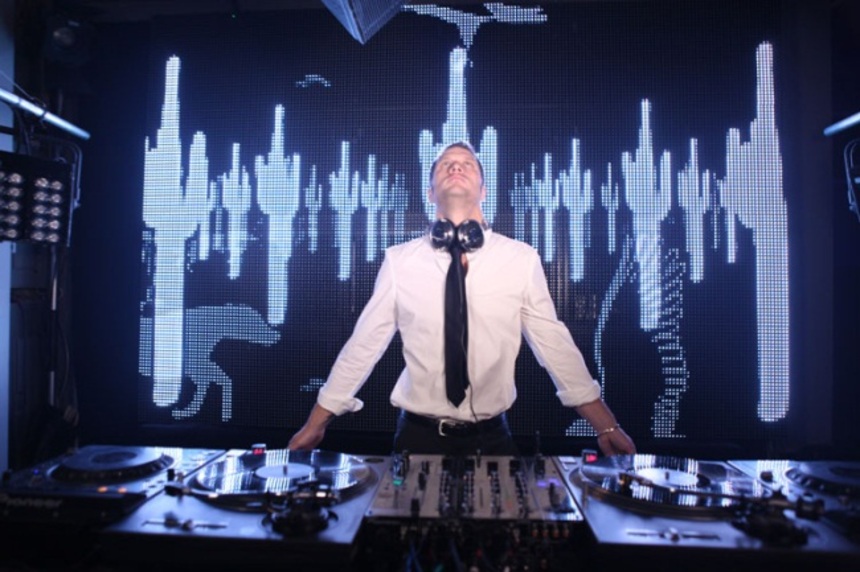Review: CAFE DE FLORE Grooves To A Superb Metaphysical Tune

The latest film from Québécois wunderkind Jean Marc-Vallée (C.R.A.Z.Y.) is a film of moments - intense emotional moments - offered up in a loose, free-wheeling montage (requiring the aid of voice-over) before settling into something deeper. The film further mines two of the more interesting themes that have been slowly emerged in my world-cinema filmgoing last year (When Café De Flore was on the festival circuit): The first pertains to raising children, and how connected our choices and beliefs (and anxieties) are to how the kids eventually turn out. I have seen this tackled in a variety of films ranging from guilt (We Need to Talk About Kevin) to paranoia (Take Shelter, Kotoko) to self-reflection (Tree of Life). The second is the relation of the universe (or spiritual) to the individuals' state of mind (Melancholia, Another Earth). Taking a multi-narrative approach, Café De Flore divides its attention between a pair of storylines which are connected at first glance only by the titular coffee-house tune (which is used here in many different musical forms) but other connective images and ideas slowly emerge before climatically aligning both timelines in a way that is both daring and profoundly satisfying.
The first thread, set in Montreal in 2011, focuses on Antoine, a world-hopping DJ going through an emotionally messy divorce of his own making. All kinds of familial emotional baggage is on the table between his former soul-mate, first love, and mother of his two girls, Carole, and a new love who enters his life, Rose. Ironically, Rose was introduced to Antoine by Carole, and their coming together, and their current sex life, is electric. Antoine alienates his kids, his own family, and social circles for this new woman and his own bid for happiness. Carole is left to struggle with her own emotional issues of abandonment, in which her only coping mechanism is to simply wait around until Antoine comes back to her. They were soul-mates, after all. Because Vallée is one of those rare directors who has a knack with integrating emotion on screen with music - case in point, C.R.A.Z.Y. offered its emotional beats through Glam Rock and Patsy Kline numbers - Antoine originally falls in love with Carole over a similar enthusiasm for pop songs, and hooks up with Rose after seeing her groove to some dance beats. Antoine's daughters use 'the soundtrack' of their parents lives, songs that resonated in their parents' relationship, as emotional javelins against their father who abandoned their mother for a younger woman. The Cure's "Pictures of You" is used to stunning effect in this manner, as if Robert Smith wrote the song just to end up here. Ditto, Sigur Rós' "Svefn-G-Englar."
The second thread is set in 1969 Paris, and involves a single mother, Jacqueline (Johnny Depp's life-partner, and prolific French singer Vanessa Paradis) who sees her husband abandon her after she gives birth to their son Laurent, who has Down's Syndrome. She endeavours to raise the boy to have as fulfilling and normal life as possible by devoting her every waking moment to his education and providing as much love as possible and protection from a rather cruel world. This approach works surprisingly well, resulting in Laurent succeeding as a placement student in a normal school. When 7-year-old Laurent meets another Down's student, Vero, it is love at first sight, and their uninhibited attachment and outpouring of emotion is extremely threatening towards Jacqueline. Where they found two child actors of this caliber is completely beyond me, as both are perfectly natural and naturally perfect.
So, in essence the two stories, and the idea of how to balance happiness of your loved ones with your own, mirror one another, and are marvelously merged together by Vallée, who is credited editor, or the more appropriate French term for it, montage. More than the sum of its parts, the film digs into how our love of others is often obsessive; you can decide whether this is in a positive or negative way (often the beginning or end of a relationship), in the same way we can react to a piece of music - both imprint the soul.
Café De Flore was not only one of the best Canadian films of last year (even the biggest enthusiast of Canadian cinema may interpret that statement as somewhat ghetto-izing) it is one of that year's best films, period. Images and music are used in ways that are both practical and literal. Disconnected images, echoes between past and present, and the medium as a specter in the same way that hauntings and nostalgia often spring from disparate memories. Like fellow director Denis Villeneuve, Jean-Marc Vallée is not afraid to make challenging adult-centric films with a hyper-polished, glossy look and feel. To further compare Café De Flore and Incendies would perhaps edge closer to spoiler territory, but suffice it to say that this film contains not so much of a twist ending, but rather opens up a very interesting (or perhaps off-putting depending on your beliefs) fork in its narrative just as it is bringing its separate roads together. Folks will be talking about the last five seconds of this movie in the same fashion as the closing shot of Another Earth, or the scene on the beach in Tree of Life. But you will probably throw one or more versions of the eponymous tune on your iPod as well, if only to remind you just how damn good this movie is.
A modified version of the review originally published in November 2011. Café De Flore is now playing in limited theatrical release in the U.S. Check official site for theaters.

Do you feel this content is inappropriate or infringes upon your rights? Click here to report it, or see our DMCA policy.






